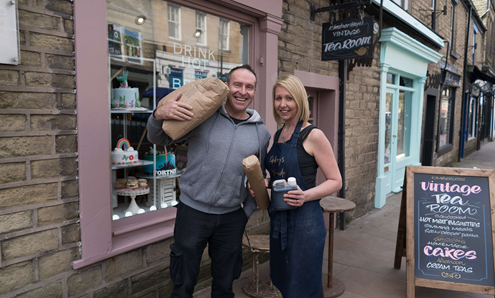Advertising is one of the pillars of business success, no matter how big or small the business in question is - it’s what grabs consumer attention, puts you on their radar, and ultimately turns them into paying customers.
But spreading the word about your fantastic small business can seem tricky when you have a tight marketing budget, so in this article, we’ll cover 13 ways to market your business on a budget.
We’ll start with totally free and resource-light tactics, move onto slightly more resource intensive but still free methods, and finish with a rundown of inexpensive tools at your disposal.
Free & easy tactics
1. Google My Business
One of the most effective marketing tools on offer in recent years is a Google Business Profile, and it’s totally free to create!
Signing up for an account will mean your business listing can show up on the local section of a Google search query and on Google maps, making it super useful for local businesses looking to bring more customers in from their area.
In order to reap the rewards, you’ll need to get your account verified by Google My Business, but don’t sweat it, you can find out how to create an account, get verified and more in our guide.
2. Social media
Growing and nurturing a community on social platforms is an effective and free way to market your small business online while at the same time fostering trust in your audience and expressing your brand’s identity.
Facebook, Instagram, and Twitter are the big names on the block, but the likes of Snapchat, Pinterest, LinkedIn, and TikTok can also be used by businesses and actually have been shown to be pretty darn effective!
The key to nailing social is to be active, consistent, and engage in a two-way dialogue with your followers - don’t only post sales-heavy content but mix it up with lighthearted posts too.
Top tip: You’ll find heaps of info on social media marketing in our blogs:
- Which social media platform is best for my business?
- How to set up Instagram for business
- How to set up a Facebook business page
- Social media tips for small businesses, and more!
3. Get tagging
On the subject of social media, it’s important to make use of the tools at your disposal within the platforms, including tags. You can tag:
- Your location to boost local marketing,
- Existing customers donning your products (remember to ask permission),
- Other businesses (not direct competitors), and so on.
The idea is to organically broaden your reach on social - the more tags, the more people who’ll see your business. For example, by tagging another business you’ll get noticed by their audience as well as your own.
It’s also a nifty idea to encourage your followers to tag your business in their posts too, as once more it’ll give you access to accounts who might not be following you, but not only that you’ll be getting your hands on user-generated content, which is mega valuable in this day and age.
4. #Hashtag
Hashtags first rose to fame on Twitter, but they can now be used on Instagram, TikTok, Facebook, and LinkedIn too - they’re another free and clever marketing tactic for broadening your reach on social.
You can jump on popular and trending hashtags, but to really get noticed use more specific hashtags that tie to your business and incorporate long-tail keywords and phrases where relevant - particularly if you’re sharing some advice or informative content.
Finally, location hashtags are a must for local businesses!
Free methods that require more effort
5. Local SEO
Local search engine optimisation (SEO) involves optimising your online presence to bring in more business and ultimately more sales from local searchers using search engines, like Google.
80% of consumers use search to find local information, so if you don’t localise your small business’ SEO you could be missing out on four out of five potential consumers.
By optimising your local SEO you could achieve:
- More website traffic
- More leads, and
- More conversions.
What small business doesn’t want a wider consumer base and more sales? Local SEO is free but does require time and effort to set up and maintain, but given the efficacy of this marketing method, it’ll pay dividends down the road.
Good to know: You can find out everything you need to know about local SEO including how to use it and reap the rewards here.
6. Email marketing campaign
Time and time again email marketing has been crowned the most effective form of marketing, and even though it can be somewhat time and effort-intensive it doesn’t need to cost a penny.
The first thing you’ll need to do is collect email addresses from your potential customers - the more the better and there are plenty of ways you can go about doing this (check out our 9 ways to get email addresses from your customers).
Next up you’ll want to craft a killer campaign that’s eye-catching, attention piquing, and frankly too good to miss. The aim of the game is to drive the reader to your website, so things like discount codes, limited time only deals, and free delivery are always big hitters.
Find out how to create a simple email marketing campaign here.
7. Eye-catching imagery
It’s a little known fact that images and infographics are actually a mega-powerful marketing tool - Twitter posts that include images, for example, boast 150% more retweets!
Now if you were to hire an agency to create an infographic for your small business it would likely take a huge chomp out of your budget, but the good news is it’s not rocket science to create one from scratch yourself.
There are plenty of online tools to choose from to get the ball rolling, many of which are free or offer a free-trial period, you’ll find a comprehensive list here.
8. Business awards
Entering yourself for local or even national business awards is a really clever way of spreading the word to others in the industry, as well as consumers, about your brilliant business, for free.
Whether you win or not, just being shortlisted will mean a wide audience of industry leaders are made aware of your business, and if you do take the prize or get named a runner up it’s a great selling point to share on your website, social pages, and via email.
Essentially it’s a tactic for marketing your business’ credibility, and the more credible you are, the more sales you’re going to make.
Top tip: Check out our guide to the small business awards you should enter.
9. Blog
Blogging is a method of driving traffic to your website, boosting consumer engagement with your business, and improving overall SEO.
Blog posts don’t need to be lengthy essays packed full of eloquent language but instead should be written in order to be easily digestible, sharing useful and informative content, demonstrating your knowledge and experience, including keywords in a natural way.
82% of businesses list blogging as critical to their success, so start a blog on your website and market your business effectively for free by simply sharing the wealth of information you have on your industry.
Pssst: You can find out more about blogging here.
10. Videos
The simple act of adding a video to your website has been found to increase your chances of showing in the first page of search engine results 50-fold - impressive, right?
It’s because videos are the content form of choice for today’s consumers - they can’t get enough of them, in fact:
- Adding a video to an email has been shown to boost click-through rates by 300%
- How-to product videos increase the likelihood of purchase by 64-85%,
- Web users are four times more likely to watch a video than read a description, and
- Experts predict by the end of this year 80% of all web traffic will be accounted for by videos.
The takeaway? Start making videos for your business to boost your marketing efforts exponentially. Not sure how? Find heaps of inspiration here.
Inexpensive tools
11. Hosting an event
It’s currently not possible to host a physical event but that doesn’t mean you can’t host an unmissable virtual event to spread the word and market your business.
It could be anything from a bake along if you’re a cake maker to a how-to class specific to your offering (i.e. how to French plait your own hair, for a hairdresser) or simply an Ask Me Anything (AMA) event to show the personal side of your business.
An event will highlight you as an authority in your field, a knowledgeable and credible business owner, and most importantly engage and provide value to your target audience - find out how to host a virtual event here.
12. Run a social media competition
A social media competition only needs to cost the price of the item or service you’re planning to give away, so they’re pretty inexpensive but can work wonders for your reach online, after all, who doesn’t love getting something for free?
Do your homework before diving in with two feet, as each social platform has its own rules for competitions and giveaways that you’ll need to brush up on to avoid a slap on the wrist and potential reputational damage.
Set your cogs in motion and find out the dos and don’ts of competitions on Facebook and Instagram in our guides:
13. Affiliate marketing
Affiliate marketing is an arrangement made between a business and an ‘affiliate’ who advertises their products online in exchange for payment. Typically it’s some sort of influencer with a large following, who’ll expose your products to a significantly larger audience than if you just posted to your own page.
The beauty of affiliate marketing is you don’t need to pay a penny until the sales start rolling in, at which point your affiliate will receive payment (typically a percentage of each sale they’ve driven) so if you’re strapped for cash in the present, affiliate marketing could be a great low-cost option for marketing your business to a wider audience and making more sales.
Top tip: You’ll find everything you need to know about affiliate marketing here.
Hopefully, we’ve shown you how to market your small business on a shoestring while still seeing great success. You’ll find tonnes more resources designed especially for small businesses over on our jam-packed blog.





